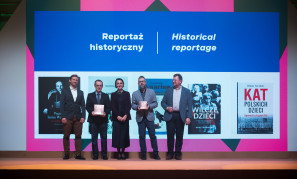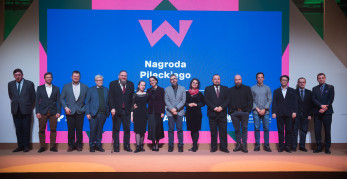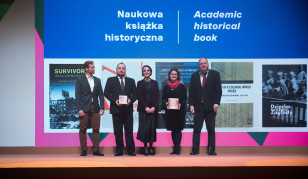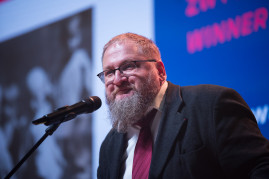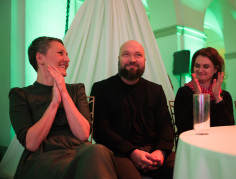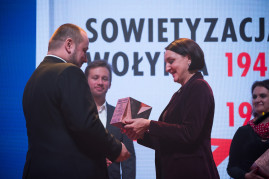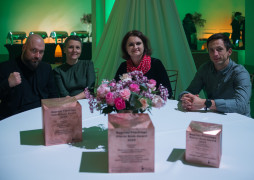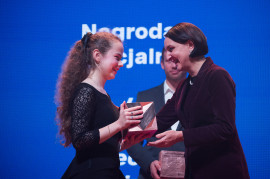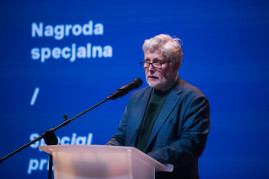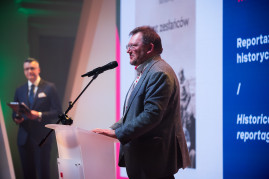The Witold Pilecki International Book Award 2023 presented! - Instytut Pileckiego
01.12.2023 (Fri) 09:00
The Witold Pilecki International Book Award 2023 presented!
The winners of this year’s Witold Pilecki International Book Award are Agnieszka Witkowska-Krych, Bartłomiej Noszczak and Zbigniew Parafianowicz. The statuettes, awards and honorable mentions were presented during a gala in Ujazdów Castle.
“In this year’s third edition, the Witold Pilecki International Book Award is presented in three categories: academic history book, historical reportage, as well as a special prize for the best book on Russia’s ongoing aggression against Ukraine since 2014,” said Prof. Magdalena Gawin, director of the Pilecki Institute, during the awards ceremony.
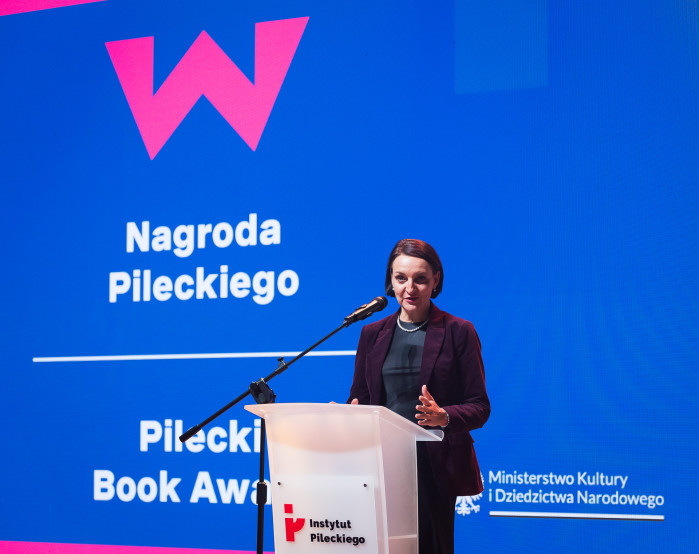
“Witold Pilecki wrote his reports so that the whole world could learn what was happening in Auschwitz-Birkenau. Today, journalists are going to Ukraine to describe what is happening on the front lines. This category is our tribute to those journalists and reporters,” Prof. Gawin added.
This category awards the best monograph or synthesis concerning the Polish experience of the confrontation with two 20th-century totalitarian regimes. The winner of the best monograph was “Dziecko wobec Zagłady. Instytucjonalna opieka nad sierotami w getcie warszawskim” by Agnieszka Witkowska-Krych, published by the Jewish Historical Institute.
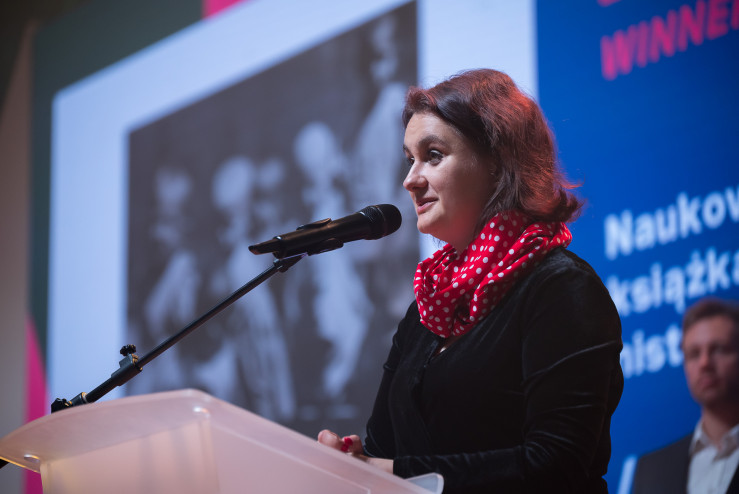
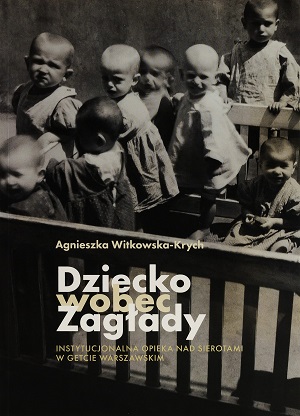
“It was so important to me to name the educators, directors, doctors, nurses who were with the children. That was the first group I wanted to bring out of the shadows. The second was the children, and that was much more difficult, because there were very few of these names, surnames, and micro-histories,” said Agnieszka Witkowska-Krych.
Agnieszka Witkowska-Krych works at the Jewish Historical Institute and the Institute of Polish Culture at the University of Warsaw. Her research focuses on the history and culture of Warsaw’s Jews.
Interview with the author on the Pilecki Institute’s Facebook profile.
Honorable mentions for “Academic History Book”
Two publications received honorable mentions in the Academic History Book category: “Survivors: Warsaw under Nazi Occupation (Studies in the Social and Cultural History of Modern Warfare)”, by Jadwiga Biskupska (Cambridge University Press), and “Sowietyzacja Wołynia 1944–1956” by Adam Rafał Kaczyński (Institute of National Remembrance).
Award for “Historical Reportage”
The Witold Pilecki International Book Award for the best work of “Historical Reportage” was awarded to Bartłomiej Noszczak, author of “Orient zesłańców. Bliski Wschód w oczach Polaków ewakuowanych ze Związku Sowieckiego (1942–1945)”, published by the Institute of National Remembrance.
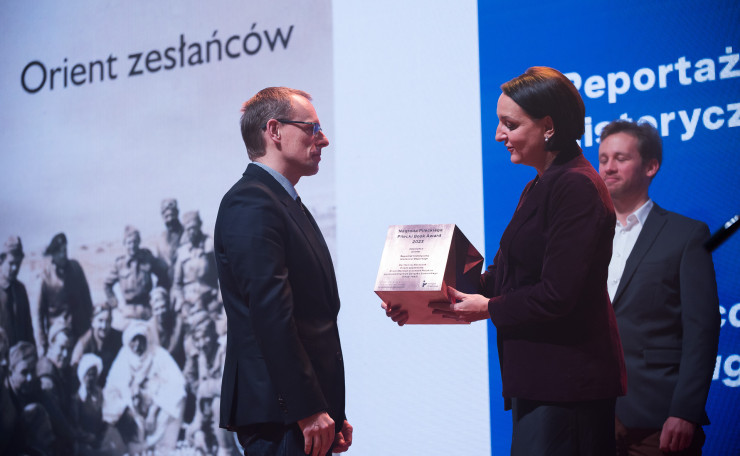
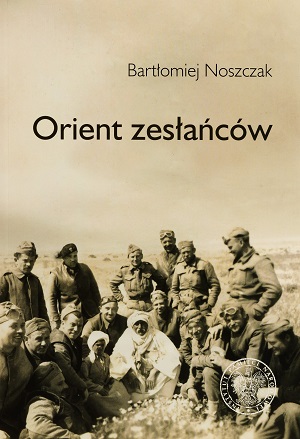
“Polish citizens mainly from the Eastern Borderlands – victims of Soviet deportations –positively verified their generally superficial perceptions of the Orient. Familiarizing themselves with the nature of this region, with all its charms and exotic mysteries, took place without the ballast of chauvinism and cultural superiority. The Polish refugees had lost almost everything materially, but they regained a sense of the freedom they had lost in the Soviet Union and embarked on a colorful ‘journey of a lifetime’ through the Middle East,
where they felt they could count on the selfless help of other human beings, apparent ‘strangers’”, Bartłomiej Noszczak said about his book in an interview with the Pilecki Institute.
Bartłomiej Noszczak works at the Institute of National Remembrance. His research focuses on the Polish experience of confronting communism.
Interview with the author on the Pilecki Institute’s Facebook profile.
Honorable mention for “Historical Reportage”
In the same category, “Akwarium. Opowieść o Związku Literatów Polskich w PRL-u” by Tomasz Potkaj (Wydawnictwo Czarne), received an honorable mention. In his report, the author paints a picture of the Union of Polish Writers, which the Communist authorities tried to use to control writers. In the era of the Polish People’s Republic, literature was a tool of Communist propaganda on the one hand, and a space for manifesting resistance against the totalitarian state on the other.
Award for third category – “special prize”
The special prize for works detailing Russia’s ongoing aggression against Ukraine since 2014 or the protests in Belarus since 2020 and the repression associated with them was awarded to Zbigniew Parafianowicz for “Śniadanie pachnie trupem. Ukraina na wojnie”, published by Wydawnictwo Mando.
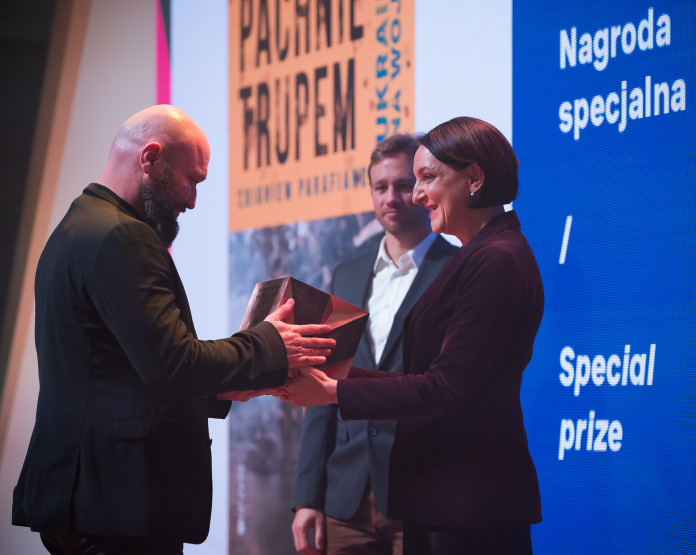
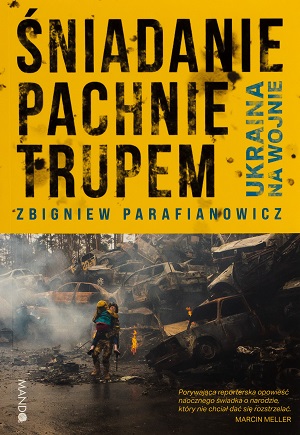
“I have been covering Ukraine as a journalistic topic since 2003. That is, since the late Kuchma era. I was planning to write a political profile of Volodymyr Zelensky. The outbreak of war changed the optics. The report was written by the events themselves. I only followed them,” Zbigniew Parafianowicz explained in an interview with the Institute.
“For me, Zbigniew Parafianowicz’s book shows that, unfortunately, after more than 70 years, war has returned to Europe and has become part of our reality. Perhaps also part of our future. And this is not a pleasant statement. Many would like to escape it, to close their eyes and shut it out. I think ‘Śniadanie pachnie trupem’ does not allow us to close our eyes,” said Prof. Marek Cichocki, a member of the Awards Committee, when presenting the award.
Zbigniew Parafianowicz is a journalist for “Dziennik Gazeta Prawna” and co-author of books about Petro Poroshenko and Viktor Yanukovych. He has been covering Ukrainian affairs since 2003.
Interview with the author on the Pilecki Institute’s Facebook profile.
Honorable mentions in the third category – “special prize”
Two publications received honorable mentions in the special prize category: “Opór. Ukraińcy wobec rosyjskiej inwazji” by Paweł Pieniążek (WAB), and “You Don’t Know What War Is. The Diary of a Young Girl from Ukraine” by Yeva Skalietska (Union Square Publishing House).
The Pilecki Award
In 2021, the Witold Pilecki Institute of Solidarity and Valor began cooperation with the Auschwitz-Birkenau State Museum in Oświęcim to inaugurate the Witold Pilecki International Book Award to commemorate the 120th anniversary of Pilecki’s birth. He became the patron of the prize by dint of his reports from Auschwitz-Birkenau, which recalled the crimes committed there by the Germans, described the events and contained in-depth analyses and humanistic reflection on the situation in the camp.
The Witold Pilecki International Book Award is presented to authors of the best academic and reportage books published in Polish or English in a given year that touch on the Polish experience of two totalitarianisms.
The Awards Committee includes Dr. Piotr Cywiński (Chair), Dr. Łukasz Adamski, Prof. Richard Butterwick-Pawlikowski, Prof. Marek Cichocki, Prof. Magdalena Gawin, Prof. Patrycja Grzebyk, Prof. Marek Kornat, Dr. Wojciech Stanisławski, Prof. Claudia Weber, war correspondent Jack Fairweather and a representative of the family of the patron of the award, Witold Pilecki’s great-grandson Krzysztof Kosior.
The winners receive a prize of PLN 40,000 and a commemorative statuette. Authors of works that receive an honorable mention are given a prize of PLN 15,000.
See also
- Oppositional Engagement of Women in Authoritarian and Totalitarian Systems of the 20th Century: Poland in a Comparative European Perspective (1919–1989)
conference
Oppositional Engagement of Women in Authoritarian and Totalitarian Systems of the 20th Century: Poland in a Comparative European Perspective (1919–1989)
We invite scholars to participate in an international academic conference devoted to various forms of activity undertaken by women who engaged in opposition and dissent under authoritarian and totalitarian rule in the 20th century.
- CALL FOR PAPERS: Oppositional Engagement of Women in Authoritarian and Totalitarian Systems of the 20th Century: Poland in a Comparative European Perspective (1919–1989)
conference
CALL FOR PAPERS: Oppositional Engagement of Women in Authoritarian and Totalitarian Systems of the 20th Century: Poland in a Comparative European Perspective (1919–1989)
We invite scholars to participate in an international academic conference devoted to various forms of activity undertaken by women who engaged in opposition and dissent under authoritarian and totalitarian rule in the 20th century.
- Pilecki Institute International Teachers and Educators Program 5th edition. Post-war decade. | Call for participants
project
Pilecki Institute International Teachers and Educators Program 5th edition. Post-war decade. | Call for participants
Recruitment for the fifth edition of the Pilecki Institute International Teachers and Educators Program has begun. We invite teachers and educators from around the world to participate in the online conference. This year, we are focusing on the history of
